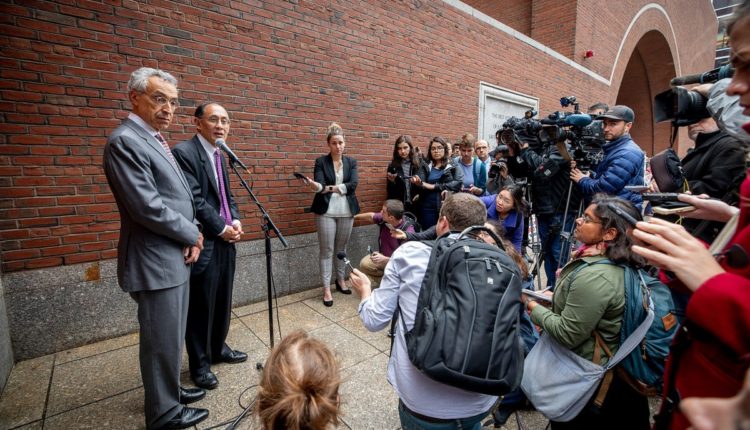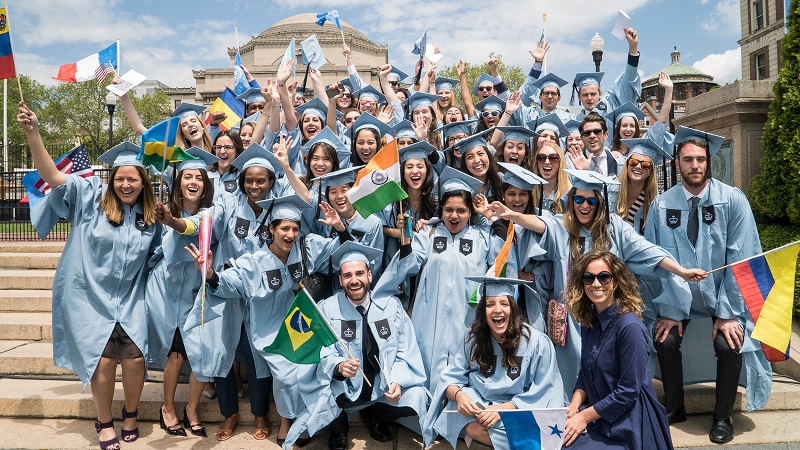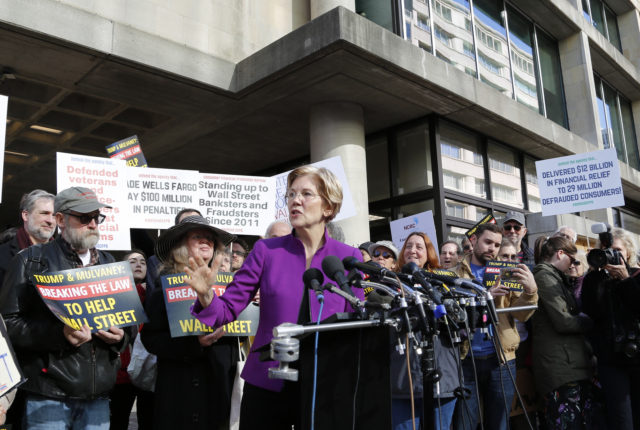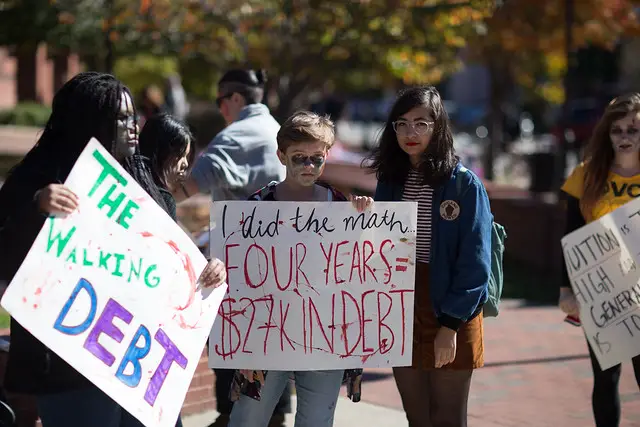Top eight issues that dominated the headlines in the higher education sector during 2019:
Student Loan Debt
When it comes to the higher education sector, student loan debt was one of the most debated issues in 2019. The year saw increased interest from lawmakers and Democratic presidential candidates on ways to tackle the increasing student debt problem.
Student loan debt is currently held by more than 42.2 million Americans, but the borrowers of color are at a greater disadvantage. Many studies in 2019 showed that student loans negatively affect the wealth accumulation of black adults who owed an average of $14,670 when they graduated, compared to $2,946 for students of other races.
In August, Betsy DeVos-led Department of Education re-wrote the Borrower Defense Rules. Critics fear that the latest regulations constitute a reversal from the strong protections issued under the Obama administration in the wake of scandals at for-profit schools. Senator Elizabeth Warren (D-Mass.) later moved a resolution seeking a retraction of many measures proposed in the new rules.
DeVos is also battling a class-action lawsuit filed by nearly 160,000 former for-profit college students for not processing the claims of loan forgiveness under the Obama-era Borrower Defense Regulations, aimed at providing relief to debt-ridden students defrauded by higher education programs.
The year saw an aggressive higher education campaign by many Democratic presidential candidates. Most of them either proposed relief for student loan borrowers or making college more affordable in their higher education policy proposals. Pete Buttigieg proposed creating a federal partnership that will make public tuition affordable for all and completely free for those from lower-income households. Beto O’Rourke proposed 100 percent student loan debt forgiveness for school teachers.
Some lawmakers even introduced bills to cancel student loan debts. Bernie Sanders bill seeks to completely eliminate student debt by imposing a tax on Wall Street and make two and four-year public and tribal colleges and universities tuition-free and debt-free.

Elizabeth Warren’s bicameral Student Loan Debt Relief Act proposes to forgive loans of up to $50,000 for those whose household gross income is less than $100,000 by using already available data on household gross income and pending student loan debt.
Earlier this month, the growing student debt problem even caught attention of President Donald Trump, who asked his aides to come up with a plan to bring relief to the borrowers.
College Athlete Compensation

The state of California enacted the historic Senate Bill 206, or The Fair Pay to Play Act that allows college athletes to receive payments directly from a private or commercial source for their name, image, and likeness. It also prohibits colleges from revoking scholarships from athletes who are paid for such considerations.
The bill was signed by Governor Gavin Newsom on September 30 despite hectic lobbying by the National Collegiate Athletic Association (NCAA) to stall the bill.
“This is the beginning of a national movement – one that transcends geographic and partisan lines,” Governor Newsom told media persons after signing the bill.
NCAA had long maintained that such bills are “harmful” and “unconstitutional” saying that it would erase the line dividing college and professional athletics and throw to wind the fairness that is associated with the college sports.
The bill encouraged lawmakers from other states to introduce similar legislations to allow their college athletes to receive compensation.
Illinois State Representative Emanuel “Chris” Welch introduced the House Bill 3904, or the Student-Athlete Endorsement Act, Florida lawmaker Kionne McGhee (D-Miami) introduced House Bill 251, while lawmakers from New York and South Carolina similar bills.
In November, NCAA Board of Governors also voted unanimously to make updates to relevant bylaws and policies allowing student-athletes to receive compensation for the use of their likeness or name. It applies to all the NCAA’s three divisions.
Chinese Influence on Campuses

Amid the renewed trade war between the U.S. and China, 2019 marked an intensified scrutiny of Chinese influence on the higher education institutions across the country.
In March, the Senate’s Permanent Subcommittee on Investigations reported concerns over the China-funded Confucius Institutes. Its report found the Chinese government spending more than $150 million on the institutes over the last decade to limit criticism of its political policies in America.
Another subcommittee report in November alleged the communist nation of using its Thousand Talents Plan (TTP) program to target U.S.-based researchers and scientists who focus on or have access to cutting-edge research and technology.
It further alleged TTP members of receiving both U.S. grants and Chinese grants for similar research and establishing “shadow labs” in China to conduct parallel research.
The reports led to increased scrutiny of faculty members, post-docs, research staff and students of Chinese descent. This was followed by two bills introduced by lawmakers in the Senate which call to stop the theft of sensitive American research from Chinese intelligence and to prohibit students from receiving student or research visas to the U.S. who are employed or sponsored by institutions linked with the Chinese military.
Concerned over deteriorating diplomatic ties, China’s Ministry of Education warned its citizens about problems they may encounter when studying and traveling in the U.S. The government also warned its students about possible visa delays and denials.
Currently, the federal government is investigating various schools for potentially concealing foreign gifts. Georgetown, Texas A&M, Cornell and Rutgers have been accused of receiving foreign funds for foreign governments including China and not disclosing them to the Education Department.
Harvard Affirmative Action Lawsuit

The much-awaited ruling in the Asian-American discrimination lawsuit filed by Students for Fair Admissions (SFFA) organization favored Harvard University. It was one of the most significant race cases in decades.
In October, Judge Allison D. Burroughs exonerated the school from the charge that its admission process discriminated against Asian-American applicants. The ruling said that its policies don’t discriminate on the basis of race and don’t place too much consideration on race while granting admission.
“Harvard has demonstrated that no workable and available race-neutral alternatives would allow it to achieve a diverse student body while still maintaining its standards for academic excellence,” Burroughs wrote.
SFFA led by Edward Blum had filed the lawsuit in 2014, alleging Harvard of applying a system aimed at maintaining a virtually unalterable proportion of students from different ethnic groups. The case went to trial in October 2018.
The U.S. Department of Justice had also filed a statement of interest before the court alleging the school of rating applicants of Asian-American origin lower on leadership and ability scores.
The University of California is also battling a similar lawsuit filed by academic Richard Sander, alleging the school of using race as criteria in admission procedures. Sander suspects that the university introduced race as a factor in admissions after it received flak over the declining enrollment of black and Hispanic students.
Declining Foreign Students Enrollments

The international students’ enrollment in the US higher education institutions continues to see a decline for the fourth consecutive year. In 2018-19, the new foreign student enrollment saw a decrease of 0.9 percent.
The number of students enrolled in undergraduate programs declined by 2.4 percent to 431,930, and the number in graduate programs declined by 1.3 percent to 377,943. Those in non-degree programs declined by 5.0 percent to 62,341.
Six out of the top ten U.S. states hosting international students also recorded a negative change. A report from the Association of International Educators (NAFSA) noted that the drop in enrollments cost the U.S. economy more than 40,000 jobs and $5.5 billion every year.
The year saw delays in issuing student visas, processing delays for the Optional Practical Training program approvals, and a doubling of Requests for Evidence related to H-1B visas. It prompted 55 post-secondary institutions in New York to write a joint letter to top members of the state Congressional delegation to bring to their attention how the delays were affecting the overall academic research community and the state’s economy.
Another 100 higher education institutions across the country filed an amicus brief in Washington Alliance of Technology Workers V. Department Of Homeland Security et al which argues that the latter does not have the authority to grant work authorization to F-1 students for Optional Practical Training (OPT).
The year also saw the busting of a network through a sting that abused the nonimmigrant student visa system. As a part of the sting, the Immigration and Customs Enforcement (ICE) had set up a fake University of Farmington, which was closed in January 2019.
The department arrested nearly 250 students mostly Indians, recruiters and deported most of them while recruiters who have pleaded guilty to charges have been sentenced in Detroit.
In June, Senators Dick Durbin (D-IL), Richard Blumenthal (D-CT), Kamala Harris (D-CA), and Amy Klobuchar (D-MN) introduced Keep STEM Talent Act that seeks to exempt international STEM graduates from restrictive green card caps that serve as a barrier in obtaining U.S. citizenship.
If the act is passed, STEM graduates could obtain permanent residency by securing employment in the U.S. in a field related to their degree, at a rate of pay above the median wage level for the position in the geographic area of employment.
Earlier this month, Columbia University launched first of its kind scholarship program in the world that will cover the cost of college for individuals who have been forced from their homes by violence, persecution and other human rights violations.
Support for DACA Program

Under the Deferred Action for Childhood Arrivals (DACA), students who arrive in the United States without documents as children are allowed to work and study and obtain protection from deportation. They are often called “DREAMers.”
During 2019, many higher education institutions rallied against repealing of the program which protects 800,000 immigrants from deportation. In September 2017, the Trump administration had formally announced the repealing of the program.
In October, 19 higher education institutions across the nation filed briefs in support of the DACA program in the case Department of Homeland Security et al. v. Regents of the University of California et al in the U.S. Supreme Court. The schools said that DREAMers, “are extraordinarily talented young people who… aspire to be leaders in public service, science, business, medicine and the arts.”
In November, the Supreme Court started hearing arguments to decide the fate of the program. National Immigration Law Center anticipates court to deliver verdict anywhere between January and June 2020.
On a positive note, many colleges launched initiatives to make education accessible and affordable for undocumented students, Colorado Mountain College started the Dream Fund that will allow the college to enter into an income-sharing agreement with such students. The DREAMers will pay reduced tuition in exchange for a set percentage of income after graduation.
Marymount University also started a scholarship program for DREAMers who are not eligible for federal financial aid.
Student Food Insecurity
Food and housing insecurity continue to grapple millions of students across the US. Nationwide, approximately half of two-year and four-year students are food insecure. Government Accountability Office (GAO) report pegs 30 percent of college students as food insecure.
Reports say lack of access to a reliable supply of nutritious food can make a student fail assignments and exams, withdraw from classes or the university, score lower grade points and even stay away from such important career opportunities as internships.
During 2019, various efforts have been taken by the higher education institutions, non-profits and lawmakers to tackle such insecurities faced by students.
In July, Senator Elizabeth Warren (D-MA) and Representative Al Lawson (D-FL) introduced the College Student Hunger Act of 2019, which would allow students who receive pell grants and independent students eligible to apply for the Supplemental Nutrition Assistance Program (SNAP) benefits. It would also lower the 20 hours per week work requirement for college students to 10 hours.

Nearly, 30 higher education groups have pledged their support for that bill that would address food insecurity on campuses across the country.
Senator Chris Murphy (D-CT) and Representative Jahana Hayes (CT-5) also introduced Closing the College Hunger Gap Act. It would collect data on food and housing insecurity on campuses across the nation and further mandate that the Department of Education notify low-income students of their food stamp eligibility when they are applying for federal student aid.
States like California took vigorous steps to ensure students access to nutritious food. In August Governor Gavin Newsom signed Senate Bill 173 which will streamline the application process and remove barriers college students commonly face when enrolling in Cal Fresh into law.
In October, ten higher education institutions in Alabama under the banner of Alabama Campus Coalition announced a collaboration to end food insecurity among students on state campuses. Schools like Virginia Western Community College launched a co-op that offers high-quality, healthy foods to students for free while City University of New York received $1 million from the City Council to address food insecurity among its students. Brown University also made policy changes so as to provide meals to all students who remain on campus during spring break at no additional cost.
Student Mental Health
Within the U.S. today, college students are one of the demographics most affected by mental illness. According to the National Alliance on Mental Illness (NAMI), one in four young adults ages 18 to 24 live with a diagnosable mental illness, and more than 25 percent of college students have been diagnosed or treated by a mental health professional for a condition within the past year.
In 2019, nearly one in three presidents of public and private nonprofit four-year institutions and one in five presidents of public two-year schools reported hearing about students struggling with mental health issues once or many times a week.
The year saw an increased focus on providing care to students experiencing mental health problems. In May, Iowa-based University of Dubuque received a multi-million gift to set up its own on-campus mental health center.
University System of Georgia constituted a Mental Health Task Force that will look at the issues, review its programs, policies and best practices to address the growing concern of mental health challenges on campuses. The University of Kentucky also created a task force comprised of senior officials to review its mental health counseling services provided to students on campus.
In June, Congressmen Chris Stewart (R-UT) and J. Luis Correa (D-CA) the Improving Mental Health Access for Students Act, which would require higher education institutions to provide the contact information for the National Suicide Prevention Lifeline; Crisis Text Line; and a campus mental health center on student identification cards or on their websites.
Non-profits are also taking a lead in addressing such issues. JED Foundation (JED) has various programs that involve working with colleges specifically to strengthen their mental health outreach.
In July, the foundation along with EVERFI co-developed the Mental Well-Being for Students course, which will give additional support to colleges and universities to provide students with the tools and resources needed to overcome mental health challenges.



